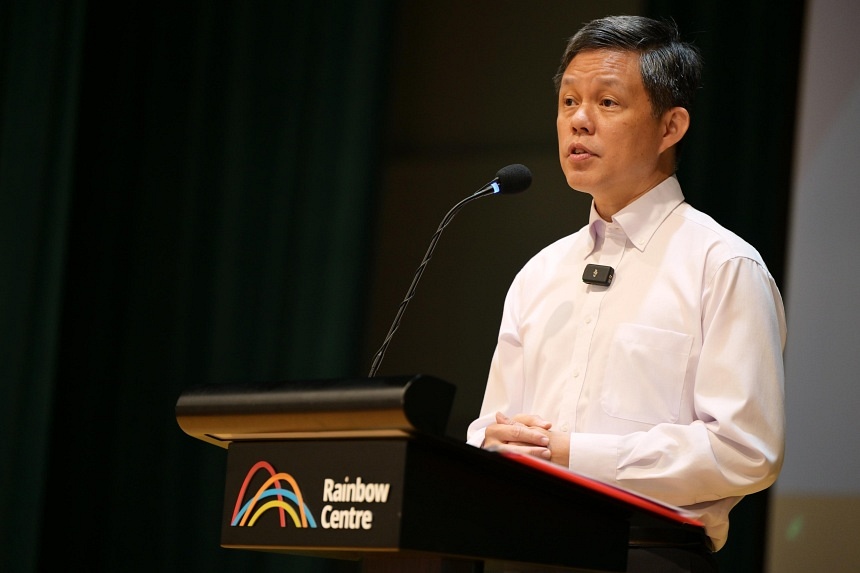from straitstimes.com:
New programme to develop pipeline of leaders in special education: Chan Chun Sing
Minister of Education Chan Chun Sing at the launch of Rainbow Centre Admiral Hill School on Oct 3. ST PHOTO: NG SOR LUAN
Shermaine Ang
UPDATED
OCT 03, 2024, 09:41 PM
FacebookTelegram
SINGAPORE - Educators in special education (Sped) schools who show potential will be given more avenues to progress and become leaders with a new programme that aims to broaden their exposure and grow their leadership abilities.
The Sped Leadership Development Programme, announced by Education Minister Chan Chun Sing on Oct 3, will start in 2025. It will offer Sped educators training opportunities like those in mainstream schools.
For a start, it aims to have up to 50 participants and this will be adjusted as needed later on, said the Ministry of Education (MOE).
Speaking at the opening of Rainbow Centre Admiral Hill School for children with autism, Mr Chan said about 50 per cent of the Sped school leadership comes from mainstream schools.
Education Minister Chan Chun Sing (left) touring Rainbow Centre Admiral Hill School on Oct 3. ST PHOTO: NG SOR LUAN
“But this is not enough. We need to make sure that the porosity starts much earlier, and I would like to have parallel training programmes for the Sped school leaders, just as I have for the mainstream school leaders.”
The “porosity” will allow leaders in Sped schools and mainstream schools to learn from one another, he said.
Under the new programme, teachers will get exposure to other Sped schools or social service agencies (SSAs) serving persons with disabilities. They could also be mentored by experienced leaders and be involved in sector-wide projects and MOE leadership milestone programmes.
The programme will help SSAs and Sped schools identify and develop educators with leadership potential to
meet the growing demands of the Sped sector, said MOE in a statement.
To deepen expertise and share good practices, “communities of practice”, or groups specialising in the needs of different disability profiles across the sector, will also be set up. The first one will start by end-2024 focusing on multiple disabilities.
“I have always said that we cannot work individually. We need to bring our capabilities together so that we learn from each other and we can progress much faster,” said Mr Chan.
“Sped is not monolithic. Within a Sped school itself, there are many sub-specialisations that are required, and we need to make sure that our energies are focused so that we can do the maximum for our children with the resources that we have.”
Cerebral Palsy Alliance Singapore will lead the first Sped community of practice for multiple disabilities, together with professionals from Rainbow Centre and AWWA, which also run schools serving students with multiple disabilities.
Students with multiple disabilities have at least two impairments across a range of sensory, cognitive and physical impairments, and may have accompanying medical issues.
The “communities” may comprise Sped educators, SSA representatives and allied professionals who will conduct workshops, produce research papers or develop new practices and resources for the Sped sector.
The groups for other disability profiles such as autism will be introduced from 2025.
The 1,700-strong Sped teaching fraternity will need another 350 teachers by 2030, as the number of Sped schools grows, Second Minister for Education Maliki Osman had said in November 2023.
There are 25 government- and community-funded Sped schools currently, with three more to open by the 2030s.
Madam Lim Ai Lay, principal of Cerebral Palsy Alliance Singapore School (West), said the leadership development programme will allow Sped teachers to gain exposure to schools run by different SSAs without having to resign, similar to mainstream school teachers.
It will allow Sped schools to grow their pool of senior teachers and programme heads, as current options for appointing Sped leaders are limited, she added.
Mr Subash Lazar, principal of APSN Delta Senior School, said having a set of tried-and-tested practices developed by the communities of practice will be useful for teachers. “When you have no structure or content, then everything is trial and error. It’s a heavy workload, and energy drain and fatigue are high.”
He said having a formalised training programme will allow Sped schools, which have less manpower compared to mainstream schools, to better plan for such staff training, so that ground staff and key personnel can cover each other.
Mrs Veronica Ho, principal of St Andrew’s Autism School, said developing teachers into leaders takes years, and the Sped sector needs to better train its leaders in macro skills such as running a school.
“Currently, the SSAs that are running the schools operate very differently, and so the teachers are familiar only with a certain way of operation. The porosity of exposure to different student profiles will stretch their thinking and deepen their knowledge.”














































































